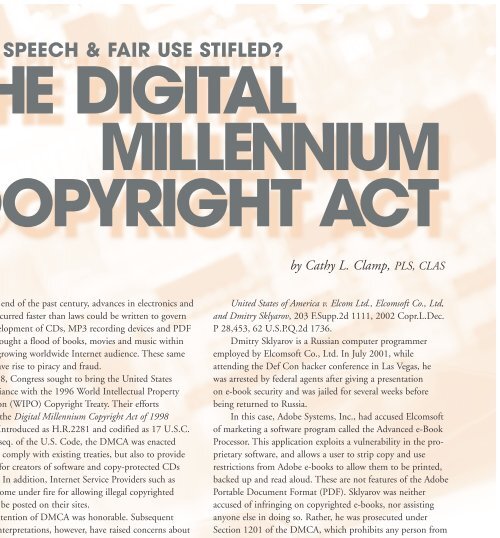Entire Issue - National Association of Legal Assistants
Entire Issue - National Association of Legal Assistants
Entire Issue - National Association of Legal Assistants
Create successful ePaper yourself
Turn your PDF publications into a flip-book with our unique Google optimized e-Paper software.
FREE SPEECH & FAIR USE STIFLED?<br />
THE DIGITAL<br />
MILLENNIUM<br />
©OPYRIGHT ACT<br />
by Cathy L. Clamp, PLS, CLAS<br />
At the end <strong>of</strong> the past century, advances in electronics and<br />
s<strong>of</strong>tware occurred faster than laws could be written to govern<br />
them. Development <strong>of</strong> CDs, MP3 recording devices and PDF<br />
s<strong>of</strong>tware brought a flood <strong>of</strong> books, movies and music within<br />
reach <strong>of</strong> a growing worldwide Internet audience. These same<br />
advances gave rise to piracy and fraud.<br />
In 1998, Congress sought to bring the United States<br />
into compliance with the 1996 World Intellectual Property<br />
Organization (WIPO) Copyright Treaty. Their efforts<br />
resulted in the Digital Millennium Copyright Act <strong>of</strong> 1998<br />
(DMCA). Introduced as H.R.2281 and codified as 17 U.S.C.<br />
§ 1201, et seq. <strong>of</strong> the U.S. Code, the DMCA was enacted<br />
not only to comply with existing treaties, but also to provide<br />
protection for creators <strong>of</strong> s<strong>of</strong>tware and copy-protected CDs<br />
and videos. In addition, Internet Service Providers such as<br />
AOL had come under fire for allowing illegal copyrighted<br />
material to be posted on their sites.<br />
The intention <strong>of</strong> DMCA was honorable. Subsequent<br />
cases and interpretations, however, have raised concerns about<br />
the protection <strong>of</strong> libraries and scientific researchers from<br />
prosecution for previously legitimate acts. Interpretation <strong>of</strong><br />
certain provisions also could pose serious problems for<br />
consumers who seek to make use <strong>of</strong> copyrighted materials<br />
that they have properly purchased.<br />
DEFINING CASES<br />
Four cases have defined the parameters <strong>of</strong> concern with<br />
DMCA, raising issues <strong>of</strong> censorship, stifling <strong>of</strong> free speech, and<br />
hindrance <strong>of</strong> legitimate competition and fair use.<br />
United States <strong>of</strong> America v. Elcom Ltd., Elcoms<strong>of</strong>t Co., Ltd,<br />
and Dmitry Sklyarov, 203 F.Supp.2d 1111, 2002 Copr.L.Dec.<br />
P 28,453, 62 U.S.P.Q.2d 1736.<br />
Dmitry Sklyarov is a Russian computer programmer<br />
employed by Elcoms<strong>of</strong>t Co., Ltd. In July 2001, while<br />
attending the Def Con hacker conference in Las Vegas, he<br />
was arrested by federal agents after giving a presentation<br />
on e-book security and was jailed for several weeks before<br />
being returned to Russia.<br />
In this case, Adobe Systems, Inc., had accused Elcoms<strong>of</strong>t<br />
<strong>of</strong> marketing a s<strong>of</strong>tware program called the Advanced e-Book<br />
Processor. This application exploits a vulnerability in the proprietary<br />
s<strong>of</strong>tware, and allows a user to strip copy and use<br />
restrictions from Adobe e-books to allow them to be printed,<br />
backed up and read aloud. These are not features <strong>of</strong> the Adobe<br />
Portable Document Format (PDF). Sklyarov was neither<br />
accused <strong>of</strong> infringing on copyrighted e-books, nor assisting<br />
anyone else in doing so. Rather, he was prosecuted under<br />
Section 1201 <strong>of</strong> the DMCA, which prohibits any person from<br />
manufacturing, importing, providing, <strong>of</strong>fering to the public or<br />
otherwise trafficking in a circumvention technology.<br />
Even after Adobe withdrew their complaint, federal prosecutors<br />
chose to go forward with the suit. Charges against<br />
Dmitry Sklyarov were ultimately dismissed and Elcoms<strong>of</strong>t was<br />
acquitted. While jurors agreed with prosecutors that the product<br />
was illegal, they understood how the law could be confusing<br />
to the Russian company. Elcoms<strong>of</strong>t’s attorney cautioned<br />
that the acquittal does not mean s<strong>of</strong>tware developers should<br />
consider themselves immune from future criminal prosecutions<br />
continued on page 20<br />
FACTS & FINDINGS / AUGUST 2003 19

















